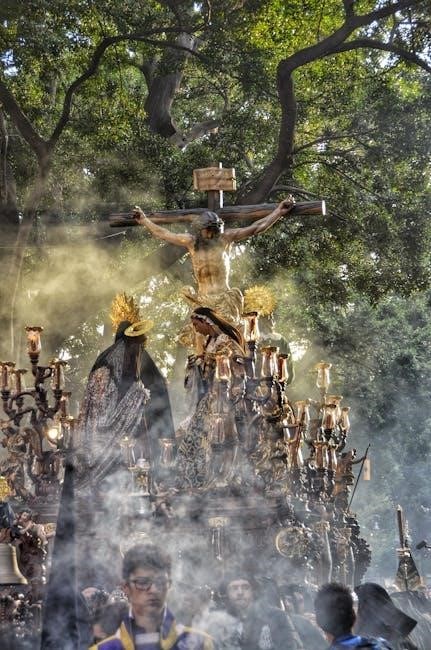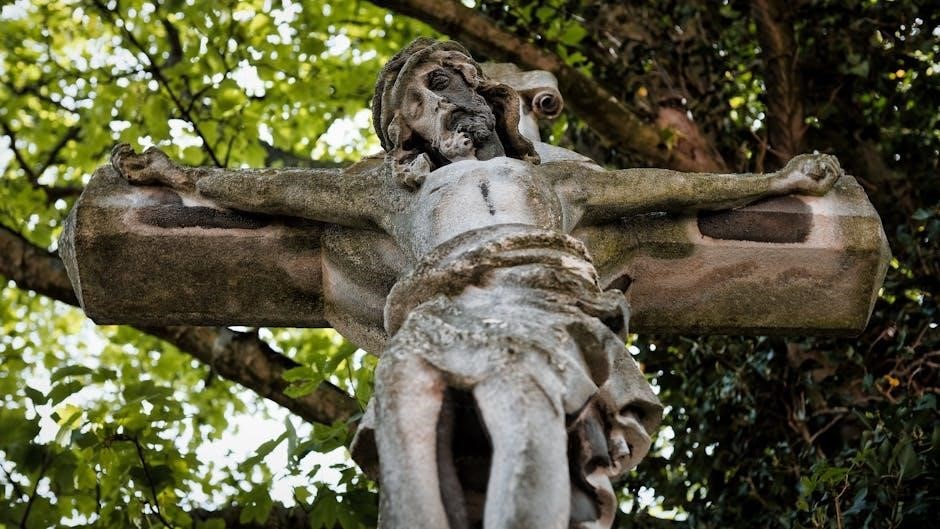
Encountering Jesus through the sacraments is a profound way to deepen faith and experience God’s grace․ This introduction explores how sacraments serve as a bridge to Christ․
Understanding the Sacraments as a Means to Encounter Jesus
The sacraments are sacred signs instituted by Christ to make spiritual realities present in the lives of believers․ Through these sacraments, Jesus offers His grace and presence, enabling believers to encounter Him deeply․ Each sacrament, from Baptism to Matrimony, serves as a tangible means of connecting with Christ․ For instance, the Eucharist allows believers to receive Jesus’ body and blood, fostering a profound union with Him․ Similarly, Penance provides an opportunity for reconciliation, reflecting Jesus’ mercy and forgiveness․ By participating in the sacraments, believers are drawn into the life of Christ, experiencing His love and transformation․ The sacraments, therefore, are not mere rituals but living encounters with the Incarnate Son of God, who continues to pour out His grace through these sacred acts․

The Importance of Sacraments in Christian Life
The sacraments hold a vital role in Christian life, serving as both a source of grace and a means of deepening one’s relationship with Jesus․ They provide spiritual nourishment, guiding believers through life’s joys and challenges․ Sacraments like Baptism initiate individuals into the Church, while the Eucharist sustains them through the reception of Christ’s body and blood․ Penance offers forgiveness and reconciliation, enabling believers to grow in holiness․ The sacraments also strengthen the faith community, fostering unity and shared spiritual growth․ By participating in these sacred rites, Christians encounter Jesus in tangible ways, experiencing His love and mercy․ The frequent reception of the sacraments is essential for living a vibrant, grace-filled life rooted in Christ․

The Theological Foundation of the Sacraments
The sacraments are rooted in Christ’s teachings and actions, serving as divine channels of grace․ They reveal God’s love and presence, instituted by Jesus to nurture spiritual life;
Sacraments as Sacred Signs Instituted by Christ
The sacraments are sacred signs and rituals instituted by Christ to convey spiritual realities and grace․ They are not merely symbolic gestures but divine actions that make God’s presence tangible․ Rooted in Scripture and tradition, these signs were established by Jesus to guide believers in their spiritual journey․ Through baptism, the Eucharist, and other sacraments, Christ imparted specific means to encounter Him and receive His grace․ The sacraments are a bridge between the visible and invisible, connecting earthly life to heavenly realities․ By participating in them, believers experience transformation and grow in holiness․ As instituted by Christ, the sacraments are essential for deepening faith and living out the Christian life․ They reflect God’s love and mercy, offering a pathway to spiritual renewal and union with Him․
The Real Presence of Jesus in the Sacraments
The sacraments reveal the Real Presence of Jesus, where He is not merely symbolically present but truly and substantially․ This is most evident in the Eucharist, where bread and wine become Christ’s Body and Blood through transubstantiation․ The Eucharist is the summit of sacramental life, offering believers intimate communion with Christ․ Other sacraments, such as Baptism and Reconciliation, also manifest His presence, healing and transforming souls․ The Real Presence is a divine gift that enables believers to encounter Christ in a tangible way, fostering a deeper relationship with Him․ Through the sacraments, Jesus continues His saving work, making Himself accessible to all who seek Him with faith․ This mystery is central to Christian spirituality, inviting believers to embrace the grace and love offered through these sacred encounters․

Exploring the Seven Sacraments
The seven sacraments are sacred rituals that deepen our relationship with Jesus, offering grace and spiritual growth․ Each sacrament uniquely reveals God’s love and transformative power in our lives;
Baptism: The Sacrament of Initiation
Baptism is the first sacrament and the gateway to Christian life, symbolizing spiritual rebirth․ Through water and the Holy Spirit, individuals are cleansed from sin and welcomed into the Church, becoming children of God․ This sacrament initiates believers into the divine life, marking the beginning of their faith journey․ As Jesus was baptized in the Jordan River, Baptism reflects His divine example, emphasizing humility, purification, and new life․ It is a sacred ritual that not only cleanses the soul but also infuses it with grace, enabling individuals to live according to God’s will․ Baptism is a profound encounter with Jesus, where His presence transforms and sanctifies, inviting believers to follow Him faithfully․
Eucharist: The Sacrament of Holy Communion
The Eucharist, often called Holy Communion, is the central sacrament of the Catholic Church, where believers encounter Jesus in the Real Presence․ Instituted by Christ at the Last Supper, it involves the transformation of bread and wine into His body and blood, uniting faithful with Him and the Church․ This sacred meal strengthens believers, forgives venial sins, and deepens their union with God․ Through the Eucharist, Jesus nourishes His people spiritually, sustaining them on their faith journey․ It is a profound expression of God’s love, where the sacrifice of Christ is re-presented, and believers are called to live as His disciples․ The Eucharist is not just a ritual but a living encounter with Jesus, who offers Himself as the Bread of Life, fulfilling humanity’s deepest longing for union with God․
Confirmation: Strengthening the Faith
Confirmation is a sacrament that deepens one’s relationship with Jesus Christ and strengthens the gifts of the Holy Spirit received in Baptism․ It is often referred to as the “sacrament of maturity,” where believers are empowered to live as witnesses of Christ in the world․ Through this sacrament, individuals are anointed with sacred chrism, symbolizing the outpouring of the Holy Spirit․ The ritual typically involves the laying on of hands by a bishop, who prays for the gifts of wisdom, courage, and understanding․ Confirmation prepares Catholics to fulfill their mission as disciples, fostering a deeper commitment to their faith and active participation in the life of the Church․ It is a powerful encounter with Jesus, who equips His followers to spread the Gospel and live virtuously in accordance with His teachings․
Penance: The Sacrament of Reconciliation
Penance, or the Sacrament of Reconciliation, is a profound encounter with Jesus Christ, offering forgiveness and healing for sins․ Through this sacrament, believers acknowledge their shortcomings, express repentance, and receive God’s mercy․ The ritual involves confession to a priest, who acts in persona Christi, followed by absolution and a penance to perform․ This sacrament restores the believer’s relationship with God and the Church, reviving the graces of Baptism․ The fruits of Penance include spiritual consolation, peace of conscience, and the strength to avoid sin․ Meeting Jesus in Penance allows individuals to experience His boundless love and compassion, transforming their hearts and lives․ By participating in this sacrament, Catholics deepen their faith and commitment to living as disciples of Christ, embracing a path of continuous conversion and holiness․
Anointing of the Sick: Healing Body and Soul
The Anointing of the Sick is a sacrament that offers spiritual and physical healing to those suffering from illness or infirmity․ Through this sacred ritual, Christ’s compassion is extended to the afflicted, providing comfort and grace․ The sacrament involves the anointing of the sick person with holy oil by a priest, accompanied by prayers for healing and strength․ It is not merely a physical remedy but a spiritual encounter that strengthens faith, forgives sins, and prepares the soul for eternal life․ The Church teaches that this sacrament can bring physical healing if it aligns with God’s will, but its primary focus is on spiritual renewal․ By meeting Jesus in the Anointing of the Sick, the faithful experience His merciful love and are reminded of the dignity of human life, even in times of frailty․ This sacrament is a powerful expression of Christ’s care for the whole person—body and soul․
Holy Orders: The Sacrament of Vocation
Holy Orders is the sacrament through which men are ordained as bishops, priests, or deacons, dedicating their lives to serving God and the Church․ This vocation is a divine call to embody Christ’s mission and to lead the faithful in worship, teaching, and service․ Through Holy Orders, the ordained are configured to Christ, the Eternal High Priest, and are empowered to administer the sacraments, preach the Word, and guide the community․ The sacrament is conferred through the laying on of hands and the prayer of consecration, perpetuating the apostolic ministry in the Church․ Meeting Jesus in Holy Orders involves a deep commitment to living out His priesthood and serving others with humility and love․ This sacrament is essential for the life of the Church, as it ensures the continuation of Christ’s work on earth through those called to this sacred vocation․
Matrimony: The Sacrament of Union
Matrimony, or the Sacrament of Marriage, is a sacred union between a man and a woman, instituted by God and elevated by Christ to a sacrament․ It reflects the love and fidelity of Christ for His Church, symbolizing a profound covenant of mutual love, respect, and commitment․ Through Matrimony, spouses are united in a lifelong bond, becoming a domestic church where they grow in holiness together․ This sacrament not only unites two individuals but also establishes a family rooted in faith, serving as a foundation for the transmission of values and the nurturing of children․ Meeting Jesus in Matrimony involves living out the sacrament with selfless love, patience, and forgiveness, mirroring Christ’s love for His Bride, the Church; It is a journey of sanctification and service, where the couple becomes a living witness to God’s love in the world․ The sacrament is celebrated through the exchange of vows and the blessing of the Church․